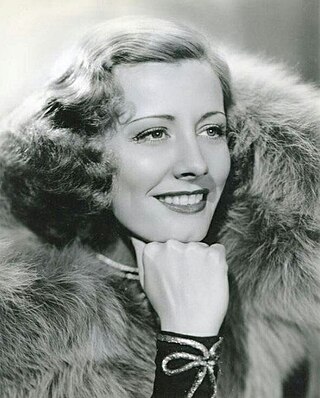
Irene Dunne was an American actress who appeared in films during the Golden Age of Hollywood. She is best known for her comedic roles, though she performed in films of other genres.

Richard Jaeckel was an American actor of film and television. Jaeckel became a well-known character actor in his career, which spanned six decades. He received an Academy Award nomination for Best Supporting Actor with his role in the 1971 adaptation of Ken Kesey's Sometimes a Great Notion.

General Electric Theater is an American anthology series hosted by Ronald Reagan that was broadcast on CBS radio and television. The series was sponsored by General Electric's Department of Public Relations.

Richard McCord Long, also known as Dick Long, was an American actor best known for his leading roles in three ABC television series, The Big Valley, Nanny and the Professor, and Bourbon Street Beat. He was also a series regular on ABC's 77 Sunset Strip during the 1961–1962 season.
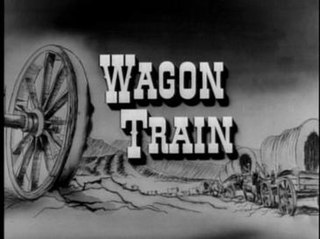
Wagon Train is an American Western television series that aired for eight seasons, first on the NBC television network (1957–1962) and then on ABC (1962–1965). Wagon Train debuted on September 18, 1957 and reached the top of the Nielsen ratings. It is the fictional adventure story of a large westbound wagon train through the American frontier from Missouri to California. Its format attracted famous guest stars for each episode appearing as travelers or residents of the settlements that the regular cast encountered.
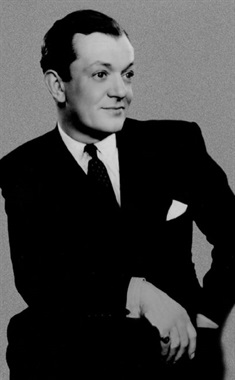
Charles Robert William Howes was a British entertainer who was a leading musical comedy performer in London's West End theatres in the 1930s and 1940s.

Lux Video Theatre is an American television anthology series that was produced from 1950 until 1957. The series presented both comedy and drama in original teleplays, as well as abridged adaptations of films and plays.
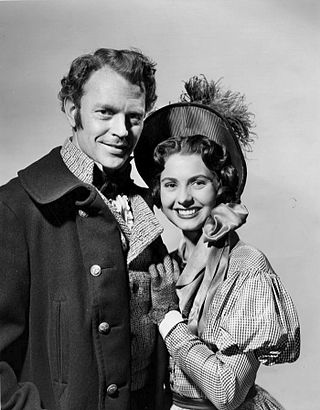
Schlitz Playhouse of Stars is an anthology series that was telecast from 1951 until 1959 on CBS. Offering both comedies and drama, the series was sponsored by the Joseph Schlitz Brewing Company. The title was shortened to Schlitz Playhouse beginning with the fall 1957 season.

Yancy Derringer is an American action/adventure series that was broadcast on CBS from October 2, 1958, to September 24, 1959, with Jock Mahoney in the title role. It was broadcast from 8:30 to 9 p.m. Eastern Time on Thursdays.

The Greatest Show on Earth is an American drama series starring Jack Palance about the American circus, which aired on ABC from September 17, 1963, to September 8, 1964. It was produced by Desilu, the production company founded by Lucille Ball and Desi Arnaz, Sr.

Target: The Corruptors! is an American crime drama series starring Stephen McNally that aired on ABC from September 29, 1961 to September 21, 1962, from 10 to 11 p.m. on Fridays. The Navy Motion Picture Service also made some episodes available on 16 mm film for showing aboard ship to personnel of the United States Navy. The series's title in syndication was Expose.
The Lawless Years is an American crime drama series that aired on NBC from April 16, 1959, to September 22, 1961. The series is the first of its kind, set during the Roaring 20s, preceding The Untouchables by half a season.

The Eleventh Hour is an American medical drama about psychiatry starring Wendell Corey, Jack Ging and Ralph Bellamy, which aired on NBC from October 3, 1962, to September 9, 1964.
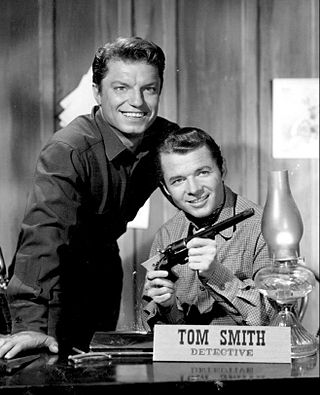
Whispering Smith is an American Western television series that originally aired on NBC. It has the same ultimate source material as the 1948 film of the same name, but differs in some significant respects.

Telephone Time is an American anthology drama series that aired on CBS in 1956, and on ABC from 1957 to 1958. The series features plays adapted from short stories by John Nesbitt who hosted the first season. Frank C. Baxter became the host effective with the September 10, 1957, episode. He hosted the 1957 and 1958 seasons. A total of 81 episodes aired from April 1956 to March 1957 on CBS, and from April 1957 to April 1958 on ABC. The Bell Telephone System sponsored the series.

Crossroads is an American television anthology series based on the activities of clergy from different denominations. It aired from October 7, 1955, to September 27, 1957, on ABC. The show was retitled The Way of Life for syndication.
Buick-Electra Playhouse is a 90-minute dramatic anthology series produced by and aired on CBS from November 19, 1959, until May 19, 1960. It was sponsored by Buick. Four episodes, all based on Ernest Hemingway's works, were broadcast.
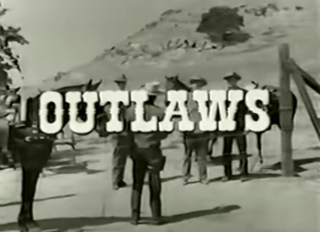
Outlaws is an American Western television series about lawmen pursuing criminals on the American frontier starring Barton MacLane, Don Collier, Jock Gaynor, Wynn Pearce, Bruce Yarnell, Slim Pickens, and Judy Lewis. The show aired on NBC during the 1960–61 and 1961–62 television seasons.

The Adventures of Kit Carson is an American Western television series that aired from 1951 to 1955 and consisted of 104 episodes. While airing, the show was shown in over 130 markets and was sold to the Coca-Cola Bottling Company by MCA-TV. After airing, MCA-TV acquired syndication rights to the show. In New York, the show aired on Tuesday evenings on WNBT (TV) and ran for thirty-minutes. The show starred Bill Williams in the title role as frontier scout Christopher "Kit" Carson, and Don Diamond co-starred as El Toro, Carson's Mexican companion.

Dick Powell's Zane Grey Theatre is an American Western anthology television series broadcast on CBS from October 5, 1956 until May 18, 1961.


















